Theory Research

Solutions to the relationship between individuals and society in Vietnam
(LLCT) - At the moment, Vietnam is developing a socialist-oriented market economy and integrating into the world. The premise for building a socialist society looking toward the future is looking for a solution to the relationship between society and individuals. Retaining a socialistic orientation is a basic condition for creating a strong, harmonious relationship between society and individuals in a way that promotes the development of both. In other words, the relationship between society and individuals is resolved only through socialism.

The fourth industrial revolution: Issues for Vietnam
(LLCT) - In the later decades of the 20th century, developed countries made many modern scientific and technological advancements in fields including information technology, electronics, universal technology, nuclear technology, nanotechnology, biology, and genetic technology, etc. These advancements were applied extensively to production as well as social life, creating a development leap. This breakthrough development created the term “knowledge economy” or “knowledge-based economy”
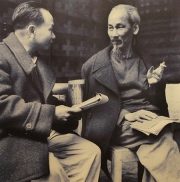
Comrade Truong Chinh’s contributions to renewing the Party’s economic thinking
(LLCT) - On Truong Chinh’s 110th birth anniversary, the Party and people of Vietnam gathered to review his merits and contributions to the causes of national construction and defense. During his life, Truong Chinh was Party General Secretary, President of the State Council, late advisor to the Party Central Committee, an eminent Party leader, and a respected Nam Dinh native. He was the author and chief leader of innovative thoughts and policies, including economic innovation in Vietnam’s historical turning points.
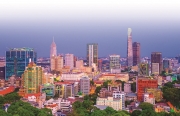
Eighty-seven years of the Vietnamese Communist Party’s historical landmarks
(LLCT) - At the 30th anniversary of the founding of the Communist Party of Vietnam (CPV), President Ho Chi Minh affirmed that the 30 years of the Party’s establishment and operation had gone down into history as “golden pages”. By spring 2017, the Party was in its 87th year of leading the revolution to achieve great victories and firmly guiding Vietnam toward socialism.
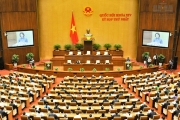
The 2013 Constitution and 12th Party’s Congress Documents on the control of state power
(LLCT) - Article 2 of the 2013 Constitution confirms, “The Socialist Republic of Vietnam is the socialist law-ruled State and of the people, by the people and for the people”; “is the country where the people are the masters; all the State power belongs to the people”. People authorize State bodies, officials and civil servants to exercise state power in legislative, executive and judicial terms. Therefore, controlling state power, preserving the nature and mission of the socialist law-ruled State, and serving people’s interests are objective and urgent demands. At the Party’s 11th Congress, the issue of controlling state power was given due attention, and it was institutionalized in the 2013 Constitution and emphasized at the Party’s 12th Congress.
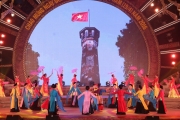
Ho Chi Minh’s viewpoints on the building and development of Vietnamese culture
(LLCT) - The objective of the revolutionary cause to which Ho Chi Minh was devoted during his lifetime was to gain independence for the nation, build a better society, bring greater freedom and happiness for people and strive for truth, goodness and beauty. Therefore, he would always pay close attention to the building and development of the nation’s culture. His point of view and instructions as to culture constituted an invaluable spiritual asset and an important foundation for our Party and people in the building and development of Vietnamese culture and people so they could enable sustainable national development.

The 12th Party Congress’ views on socio-economic development for 2016-2020
(LLCT) - Based on the five development views mentioned in the Strategy for socio-economic Development 2011-2020 and given the actual socio-economic development in the 2011-2015 period and the new situation, the Party’s 12th Congress came up with four views on socio-economic development for the 2016-2020 period.
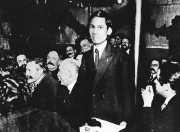
Ho Chi Minh’s thought of independence and freedom: The unity between national and human rights
(LLCT) - Nguyen Ai Quoc attached great importance to the right to independence of colonized peoples including Vietnamese. He was deeply aware of Lenin’s point of view on the role of colonial revolutions and the right to independence of colonized peoples. Addressing the 22nd meeting of the 5th Congress of the Communist International on July 1, 1924, he pointed out, “According to Lenin, for the revolution in the West to succeed, it must be closely connected with anti-imperialist liberation movements in colonized and enslaved countries. National issues are merely part of the general issue related to the proletariat revolution and proletariat dictatorship”

New arguments about the ongoing development of the socialist-oriented market economy in Vietnam
(LLCT) - The socialist-oriented market economy in Vietnam is a completely new model. It is unprecedented and has developed for 30 years. Therefore, the development of this model is a process of constant perfection, innovation and creation in terms of perception, theoretical thinking and practice. Documents of the Party’s 12th Congress inherited, clarified and expanded on a number of important arguments including those mentioned for the first time.
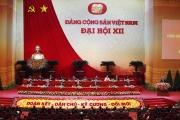
New viewpoints on, and solutions to, Party building in the Party’s 12th Congress Documents
(LLCT) - The Party’s 12th National Congress ended successfully. The Congress discussed draft documents of the 11th Central Committee, in a democratic manner and reached a high degree of unanimity about them. There were quite a few new things to the documents of the 12th Congress, especially its Political Report, compared to the Political Report of the 11th Congress. This showed development in the Party’s awareness, theoretical thinking and creative application suitable for the realities of the country.
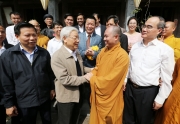
Promoting great national unity, and successfully building and firmly safeguarding the Fatherland in the present context
(LLCT) - Great national unity is always a matter of strategic importance, a consistent way of thinking and a common thread running through the Party leadership on the country’s revolutions. Continuing the implementation of the “great national unity” policy, given the current globalization and international integration, the Party’s 12th Congress pointed out, “Great national unity is a strategic policy and a major source of inspiration and resource for national building and protection”(1).
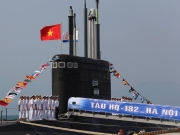
The Party’s new thinking on strengthening national defense capabilities to protect firmly the country in new situations
Evaluating the implementation of the Resolution of the 9th Party National Congress and looking back on the 30 years of national renovation, the Party pointed out that international, regional and national situations had a direct impact on national construction and protection and that there had to be fundamental points of view and orientations related to the task of protecting the Fatherland as well as new thinking on the building of the people’s armed forces, people’s Army and all-people defense disposition. National defense and security mechanisms and policies had to be perfected. National solidarity had to be put to good use to protect firmly the socialist Fatherland of Vietnam in new circumstances.
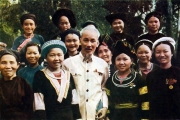
Ho Chi Minh’s philosophy of social progress and its significance to awareness of developmental goals in Vietnam
(LLCT) - Ho Chi Minh’s views on social progress are of philosophical importance because they are a set of ideas combining Marxist philosophy of social progress and experience in actual Vietnamese revolutionary activities and the world’s views on social progress together. By acquiring the world views and methodologies of Marxist philosophy, Ho Chi Minh pointed out the role of the masses in the historical development of the society, thereby establishing goals for the Vietnamese revolution.

For comprehensive development of Vietnamese culture and people according to 12th Party Congress
(LLCT) - As far as the development of culture and people is concerned, the Party’s 12th Congress called on “authorities at all levels and industries to have a full, profound awareness of the special importance of culture and people; achieve comprehensive development of Vietnamese culture and people characterized by truth, good and beauty and imbued with the spirit of nationality, humanity, democracy and science; build culture into a solid foundation of society; and achieve comprehensive development of Vietnamese people”.
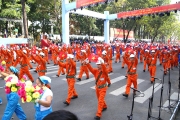
Upholding the CPV’s working-class nature in new contexts
(LLCT) - The working-class nature of the Party is manifested in the fact that its objectives and ideals are socialism and communism; that its ideological foundation is Marxism - Leninism and Ho Chi Minh Thought; that its fundamental organizational principle is centralized democracy; that it is in close touch with the masses; and that it considers criticism and self-criticism to be its developmental law.
Journal Archives
Journal Archives
Media
Photo Gallery
Contact us

 Theory Research
Theory Research


